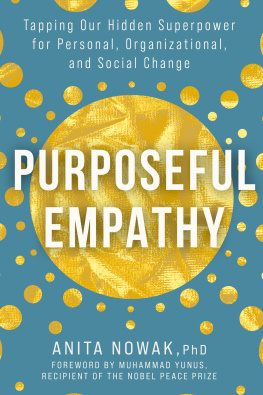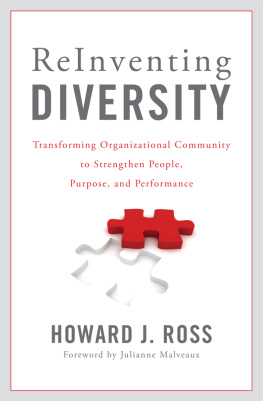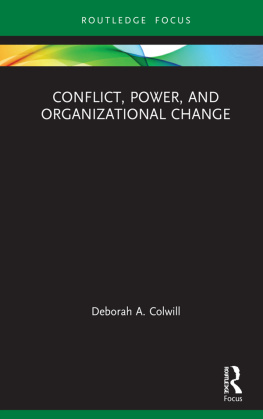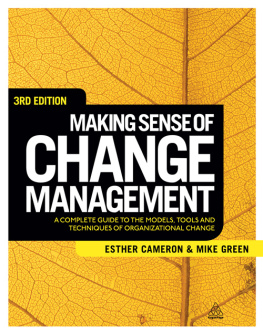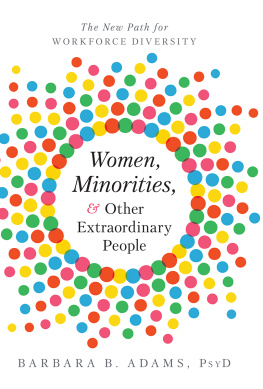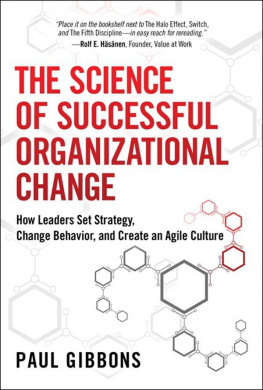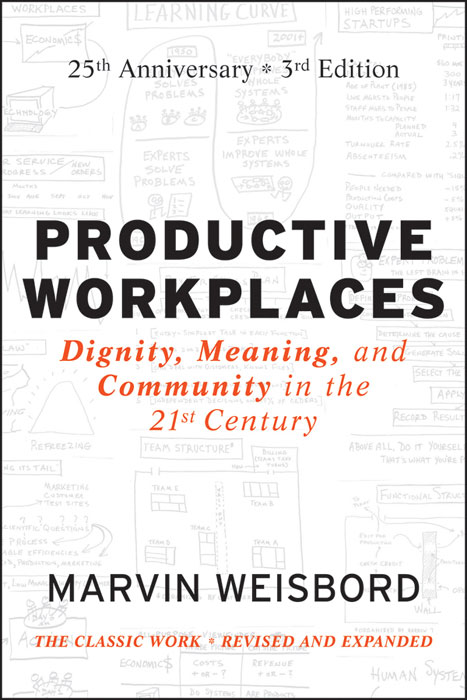I have been a fan of Marv Weisbords for years. His thoughts and understanding of how people and organizations accomplish work improves with each update of Productive Workplaces. He is a master of this subject and, most importantly, he helps us practice what he teaches.
Richard G. Haworth, Chairman Emeritus, HAWORTH, INC.
Weisbord has been a major voice in the theory and practice of organization development (OD) since the early 1970s. This book is a wonderful history and reinterpretation of many of the events, schools of thought, and controversies that have punctuated the field from its beginnings. It should be required reading for every organization behavior and development scholar. Among its many virtues, the book is beautifully written.
Peter Vaill, Senior Scholar and Emeritus Professor of Management, Antioch University Ph.D. Program in Leadership and Change, author of Learning as a Way of Being: Strategies for Survival in a World of Permanent White Water and Spirited Leading and Learning (Minneapolis, MN, USA).
During my thirty-three-year career, I have been involved in publishing well over one thousand books. Productive Workplaces is certainly among the top five most influential in terms of its impact on the organizations in which I worked as well as on my personal leadership, management concepts, and practices.
Steven Piersanti, President and Publisher, Berrett-Koehler Publishers, Inc. (San Francisco, CA, USA, formerly president, Jossey-Bass Publishers)
Reading the 1987 version of PW in the early nineties was a major stepping stone for me towards a more fulfilling, creative, and dynamic way of thinking and working.
Richard Wilkinson, HR Director, International Training & Education Center for Health (I-TECH) a partnership of the University of Washington and University of California San Francisco (Seattle, WA, USA)
I discovered Productive Workplaces when I began teaching in the Pepperdine MBA program in 1990. I loved that Marvin had gone back and read the primary resource material written by the great management thinkers of the twentieth century: Taylor, McGregor, Lewin, Emery, and Trist. The book provides a cogent overview of management thought and how it has evolved over the last century.
Miriam Y. Lacey, Ph.D., Academic Director and Professor, MSOD Program, Graziadio School of Business and Management, Pepperdine University (Malibu, CA, USA)
PW illuminated a path that would become my lifes work. Future Search gave me the practical understanding and tools to take the journey.
Shem Cohen (USA), Change Events, Inc.
Reading Productive Workplaces we encountered a vision of a workplace in which people matter, teams collaborate, and direct participation enables individuals to contribute their full range of talents. That vision is just as relevant today as in 1987perhaps more soas change becomes constant and speed becomes imperative.
Frederick A. Miller and Judith H. Katz, The Kaleel Jamison Consulting Group, Inc., authors of The Inclusion Breakthrough: Unleashing the Real Power of Diversity (Albany, NY, USA)
Organizations that value dignity, meaning, and community are not born overnight. The wisdom I have gained from Productive Workplaces Revisited has provided me with techniques, processes, and the openness I need for consulting to organizations that aspire to build these values into their cultures.
Richard Beckerman, President, Richard Beckerman Consulting (Seattle, WA, USA)
I have a much-dog-eared copy of Productive Workplaces, which I read while managing an R&D lab at NYNEX (then the Baby Bell in New York and New England). The book was a turning point for me. It inspired me to run against the grain of re-engineering with a participative work design project for a critical business process. That project was one of the most successful among a spate conducted during the re-engineering craze at NYNEX (and it required no new technology!).
Jim Euchner, Visiting Scientist, MIT Sloan School of Management (Cambridge, MA, USA)
As a professor in graduate studies in leadership and business psychology, I see my role as passing on to a new generation the values and lessons learned from a twenty-five-year career in organizational effectiveness. Marvin Weisbord is a master whose wisdom I encourage my students to seek out. Productive Workplaces has been an anchor in my life and career. It is my mission to see that it becomes the anchor for a new generation of practitioners.
Connie S. Fuller, Ph.D., Associate Chair and Assistant Professor, Business Psychology, The Chicago School of Professional Psychology (Chicago, IL, USA) co-author, Bridging the Boomer-Xer Gap: Creating Authentic Teams for High Performance at Work.
I devoured the first edition of Productive Workplaces. Here was a book that confirmed everything I had experienced in my consulting career. I felt validated. Today when people ask me where they can learn about the history of the field, this is the one book I recommend.
Dick Axelrod, The Axelrod Group (Chicago, IL, USA), author of Terms of Engagement: New Ways of Leading and Changing Organizations .
PW has shaped the way I have approached my consulting practice for nearly twenty-five years.
Loretta Raider, Principal, The Raider Consulting Group (Melrose Park, PA, USA)
Productive Workplaces (PW) is more than a book about the field of organization development; it also shows the possibility for aligning yourself with basic values about [organization and management] and some hints about trying new ideas for yourself. This takes courage, of course, and courage has meaning only in situations where you are in doubt. With PW in your hands you are not alone.
Henrik Simmelkjr, Consultant (Kolding, Denmark), former secretary of European Institute for Transnational Studies in Group and Organizational Development (eit).
This is the OD book of the century.
Bengt Lindstrom, Ander & Lindstrom, AB (Stockholm, Sweden)
Marvin Weisbords story of his own encounter with worker participation in his family business was a me-too story of great power. To read the unfolding argument in favour of letting those with a stake in the problem help define and solve it was rivetingit affirmed and informed my research and my practice as a consultant to industry then, and continues to do so now.
Verna Blewett, Associate Professor, Occupational Health and Safety, University of South Australia (Adelaide, Australia)
If somebody asks me to name just one good book on management, or organization development, or social psychology, I give them the same answer: Productive Workplaces. It addresses the heady topic of meaning and dignity in work with writing that is as engaging as a well-written novel.
Gil Steil, Gil Steil Associates (Boston, MA, USA)
So far as I know, PW provides the only systematic review of multiple cases over the longer term, fifteen to thirty years after the intervention.
Tonnie Van der Zouwen, Ph.D., Van der Zouwen Consultancy, author of Building an Evidence Based Practical Guide to Large Scale Interventions: Towards Sustainable Change with the Whole System (Vlijmen, Netherlands)
While I cant say that Productive Workplaces saved me from a burning building or plucked me from a raging river, I can say that this book slowly, systematically changed my thinking, my career, and my life.
Birgit C. Olsen, Higher Education Consultant, doctoral student in organizational psychology, Walden University (Los Angeles, CA, USA)
Productive Workplaces has been required reading since 1987 in Seattle Universitys Organization Systems Renewal (OSR) graduate program (formerly at Antioch Seattle). OSRs founding principle is to learn the theory, acquire the knowledge, and practice the skills required for putting theory into action. That is exactly what PW shows you how to do.


